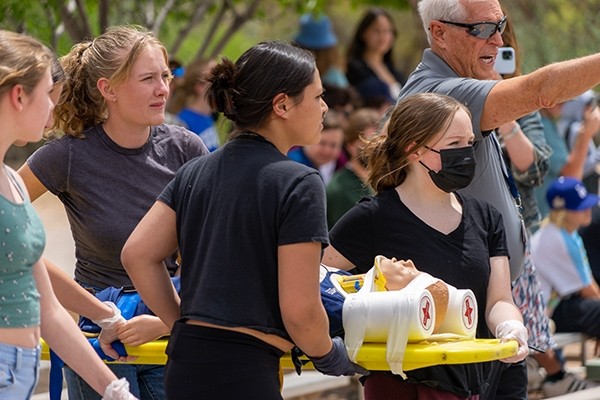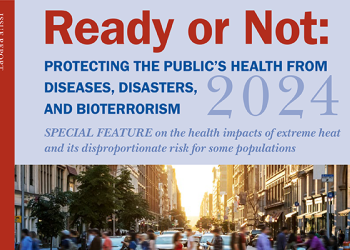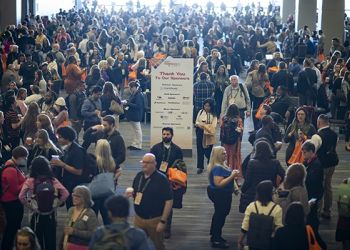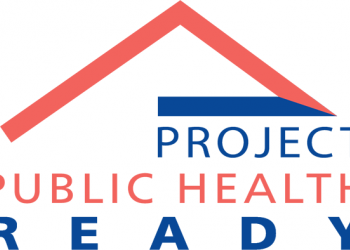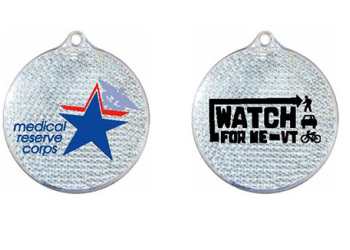As many Medical Reserve Corps (MRC) units welcomed new volunteers to their ranks during the COVID-19 pandemic, efforts are now turning to retention of those volunteers along with recruitment to bolster ranks as some volunteers return to their daily lives. This month we profile three units who are nurturing a new generation of volunteers by engaging high school students.
Macon County MRC (MO)
The Macon County MRC serves a very rural area in Missouri which is experiencing medical shortages. Macon County Health Department Administrator Mike Chambers noted that “getting nurses and doctors is tough.” While recognizing that older and retired professionals provide a lot of support to the unit, during its strategic planning three years ago, the unit identified involving youth among its recruitment and retention strategies.
The unit first identified 4-H as a potential partner in youth recruitment. Then they happened upon the HOSA (Future Health Professionals) health occupations class at their local high schools which are run by a nurse. The MRC works with school instructors to supplement and support trainings. The students then serve as MRC volunteers in a variety of capacities.
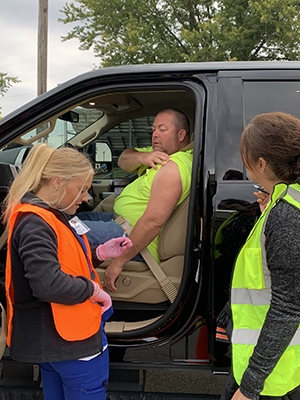
Students have assisted with mass vaccination clinics, including flu clinics each October which serve six-to-seven different towns. School seniors serve as vaccinators under nursing supervision. Students also help out at health fairs at six public and two private schools with volunteers from two classes taking morning and afternoon shifts. Student volunteers have also worked in-house at the health department shadowing staff.
“This provides students with a little bit of a different view on health,” said Chambers. “It’s an opportunity to impact population health rather than a person and to see what public health is about; to see what true prevention is.”
Through connection with the MRC, students have done hands-only CPR and bullying training. They have learned different aspects of drive-thru clinics, registration and monitoring for COVID-19, and learned all aspects of how a clinic runs.
“We try to make it fun and interesting,” said Chambers. “It allows them to see they can be passionate about something.”
Future missions for these youth volunteers include supporting local schools and daycares in implementing a child ID program following the FBI’s approved program. The unit is also exploring a mental health program for youth, looking to get volunteers involved in ACES and stress management.
Bosque School Junior MRC (NM)
As they did in many other MRC units, volunteers at the Bosque School Junior MRC helped hundreds in their community get vaccinated during the COVID-19 pandemic. Not as common, these volunteers weren’t taking time from work or retirement to assist. This unit’s membership consists of high school students from the Bosque School, an independent college preparatory school in Albuquerque, New Mexico, serving students in grades 6-12. The school is recognized by their state as an Emergency Medical Services Agency and student MRC volunteers are licensed first responders.
Students interested in getting involved become recruits in their sophomore year and prepare to take a course offered in partnership with the Central New Mexico Community College. Upon completion of the three-week course, students become licensed in the state of New Mexico and also become part of the school’s emergency response team. Previously, MRC members served the role of school nurse on campus. Now they work in partnership with the school nurse to practice skills and provide care.
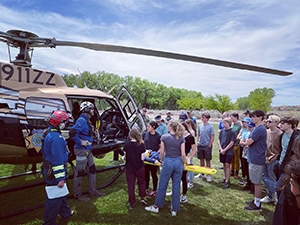
Unit Leader Amy Dalness provides oversight and administration for the unit, its university partner serves as unit director, and the school nurse attends unit meetings and trainings and provides mentorship to members.
“It’s a pretty popular program,” said Dalness. “Some students were helped by an MRC member when they were younger. We’re proud that we offer this unique, hands-on experience.”
The school has about 500 students on campus and currently has 12-15 active/licensed MRC members with another eight in the recruit class. Prior to COVID-19, the unit had about 22 active members and the unit is working to rebuild that.
Members meet weekly with at least 30 minutes of training during each meeting. Monthly or bi-monthly volunteers train with the medical director and the unit plans to add community members to those trainings in the future. Two students will become CPR instructors and will offer training at the school and in the community.
“The unit provided inspiration and skills to students who have gone into medical professions, from EMTs to doctors,” said Dalness. “Those in the MRC prior to the pandemic are coming back to train and talk to students. They have a love of health care and service to others. They are passionate and excited. It’s an investment in youth.”
The unit has always been involved in vaccination clinics and has also deployed in the state to support large events, staffing first aid tent and providing first aid medical support. The unit works with neighboring MRC units and is looking to partner with other community events to provide first aid and grow its connections with community health partners.
Two students from the unit are going to be part of the Albuquerque Citizens Corps Council, sitting next to representatives from Red Cross, the Department of Health, FEMA, and other MRC units.
“They’re the only youth involved,” said Dalness. “It’s giving more space for youth to have a voice in public health decision making.”
Dalness notes that it does take more work to support a unit of student volunteers.
“The students are in a different place in life,” she said. “It takes hands-on mentorship, but to have them get excited about CPR instruction and talk about wound care to middle schoolers is really rewarding. They absorb skills and knowledge and want to share. It’s cool to see 11th graders teach 10th graders.”
She encourages those working with youth to be proactive in your communication and to let parents and guardians know what is going on.
“I’m so inspired by my students and their excitement for medicine and community health,” said Dalness. “It’s rejuvenating to be part of this and incredible to see the return on investment—it’s so worth it. Youth are our future. Give them the tools.”
Rhode Island Junior MRC
As COVID-19 deployments began to wind down, the Rhode Island MRC was thinking strategically about what was next for the unit. Leaders saw that many of the active and engaged volunteers who had joined during the pandemic were going back to their regular work. The unit identified youth as “critical to the future of the MRC and volunteers.”
As such, it began forming a Junior MRC to work with youth ages 14-17. Unit Leader Elena Wildes began outreach to those who are junior volunteers with the fire department and to Scout Troop participants who were working on first aid and emergency preparedness badges.
“This is the next generation,” said Wildes. “We’re interested in getting them prepared and excited about being active community members.”
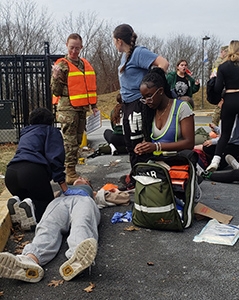
As one of its first activities, the unit worked with high schools and Rhode Island National Guard on mass casualty planning and an event. This was the unit’s first hands-on event with youth and about 75 students were fully engaged. The unit did a couple of training days, providing trainings in basic first aid, splinting, wound packing, Stop the Bleed, and training with mannequins. Students then formed into pods and were given supplies to provide triage and response.
As it begins to on-board volunteers, students will start with a core curriculum including orientation; FEMA 100, 700, and 800 course; CPR; Stop the Bleed; and basic first aid. Wildes recognizes that getting youth through these initial trainings may be the unit’s first biggest hurdle and plans to do as many of these trainings in-person as possible, incorporating hands-on and varied activities. From there, the unit will tailor training to the youth interest.
“We hope to meet at least one day a month at our training facility,” said Wildes. “We want them to be able to see all the missions coming in. We’re looking for constant feedback and getting to know youth through training and orientation.”
In addition to email and text communication with Junior MRC volunteers, the unit is working to get an online and web presence. They plan to be active on social media, including Facebook, Instagram, and TikTok. They’ll use QR codes, live links, and short, upbeat videos to keep volunteers active and engaged between trainings and missions.
“We’re looking to connect the concepts to real life to get youth excited,” said Wildes.
